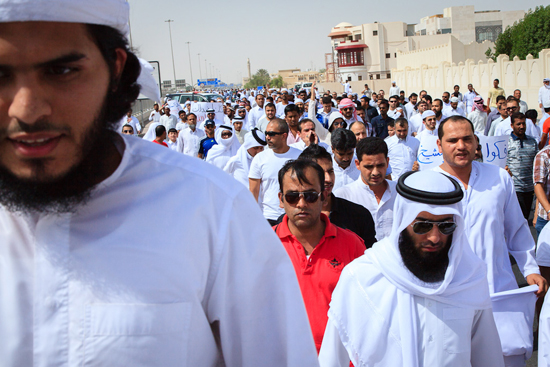The Real Meaning of the Middle East Firestorm
BU’s El-Baz on the Benghazi question

Thousands of people gathered September 14 at a Qatar mosque for a march to the U.S. Embassy to protest a video on YouTube mocking the prophet Mohammad. Photo by Omar Chatriwala
It started on Tuesday, September 11. Islamic militants armed with rocket-propelled grenades stormed the American embassy in Benghazi, Libya, killing ambassador J. Christopher Stevens and three other Americans. The violence, reportedly sparked by anger over a YouTube video that mocked the Prophet Muhammad, has since spread to 20 cities in the Middle East, and American and European diplomatic outposts have been attacked from Cairo to Jakarta.
Initially, the source of the video was shrouded in confusion. It was purported to be the work of an Israeli living in California, then it was attributed to right-wing Christians. It now appears that one of film’s makers was Nakoula Basseley Nakoula, a Coptic Christian from California who was once imprisoned for intent to manufacture methamphetamine and for fraud. Google, the owner of YouTube, defended its posting of the video, but blocked access to it in Egypt and Libya.
The true source of the Benghazi assault was also unclear. There is speculation that the attack had been planned in advance, with special meaning for the date: September 11.
As violence appears to wane, BU Today spoke with Egyptian-born Farouk El-Baz, a College of Arts & Sciences research professor of archaeology, a College of Engineering research professor of electrical and computer engineering, and director of the BU Center for Remote Sensing. El-Baz, who was science advisor to the late Egyptian President Anwar Sadat from 1978 to 1981, is a frequent guest on National Public Radio, Public Radio International, and on NECN.
BU Today: If the U.S. State Department had previous knowledge of the defamatory film, as recent reports say, should it have acted in some way?
El Baz: I don’t think the State Department or anyone in United States could have expected that upheaval. The reason for the upheaval is that people in all Muslim countries know that their governments review and approve movies and show them before they are broadcast anywhere. Thus, they assumed that the U.S. government had approved that trailer. This is where the blame of America originated. To this day many ‘observers’ fail to mention this fact and relate it to the over-the-top reaction of simple people in these countries.
What brewing anti-U.S. resentments did this video trailer ignite? What are the roots of those resentments?
In the Middle East, it could be what is conceived as blind support of the state of Israel and the neglect of the Palestinian aspirations.
Farther east, it is partly the invasion of Iraq under the pretense of weapons of mass destruction and the long stay in Afghanistan beyond the defeat of the Taliban.
Do the protesters believe all Americans are anti-Muslim, or is it just a small minority who blame the United States as a whole for this isolated, malicious incident?
The blame is directed toward the U.S. government. That is why attacks are directed at embassies and not American businesses or individuals.
The mobs did not attack American tourists or any of the numerous American universities in the region. They attacked the embassies because those represent the American government, which to the protesters had approved that dreadful movie.
The protesters insist that blasphemy is a crime and should not be protected by free speech, but in the United States it is protected speech. How can we respond to concerns in a way that doesn’t further fan the flames?
We can at least explain that the U.S. government does not review or approve movies and considers this particular one insulting and atrocious.
How much of the unrest apparently triggered by the video has been percolating because of domestic problems like youth unemployment, corruption, and civil conflicts plaguing such nations as Libya, Egypt, Tunisia, Pakistan, Lebanon, and Sudan?
I think the dire social conditions and lack of employment had a great deal to do with encouraging the youth to gather and raise havoc; they have nothing to lose.
What do you think of President Obama’s and Secretary Clinton’s handling of the crisis? What could they have done differently or more effectively?
I think they both did as well as could be expected; I just wish someone had told them to stress the lack of a government stamp or seal of approval, since that is not known in those countries at all. A statement to that effect could have quieted down many of the demonstrations.
How well do western media portray the peaceful majority of the Islamic world?
There is a great deal of “ignorance of the other” on both sides of the ocean.
Should Google have taken down the video?
Yes, in the aftermath of the embassy attack and death of Ambassador Stevens.
Is there evidence that the attack was planned?
I do not know, but I don’t think so. The mob attacked the consulate building because it formally represents the USA.
What role did cultural differences play in the initial incident and the spread of violent demonstrations throughout the Arab world?
Very little; ignorance played a leading role.
How and why did anger spread so far and ignite so quickly?
Because Islam has not gone through questioning and a reformation the way Christianity did. God and his prophets (Moses, Jesus, and Mohammad) are not open to any ridicule, no matter what or by whom. Just their mention evokes attention and prayers.

Comments & Discussion
Boston University moderates comments to facilitate an informed, substantive, civil conversation. Abusive, profane, self-promotional, misleading, incoherent or off-topic comments will be rejected. Moderators are staffed during regular business hours (EST) and can only accept comments written in English. Statistics or facts must include a citation or a link to the citation.